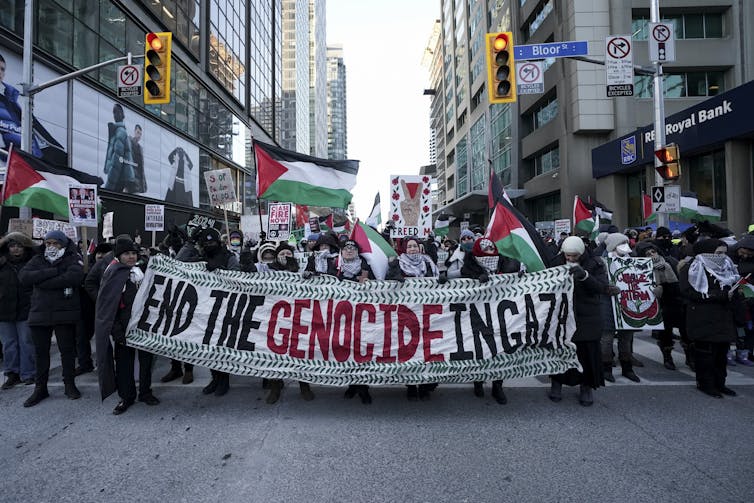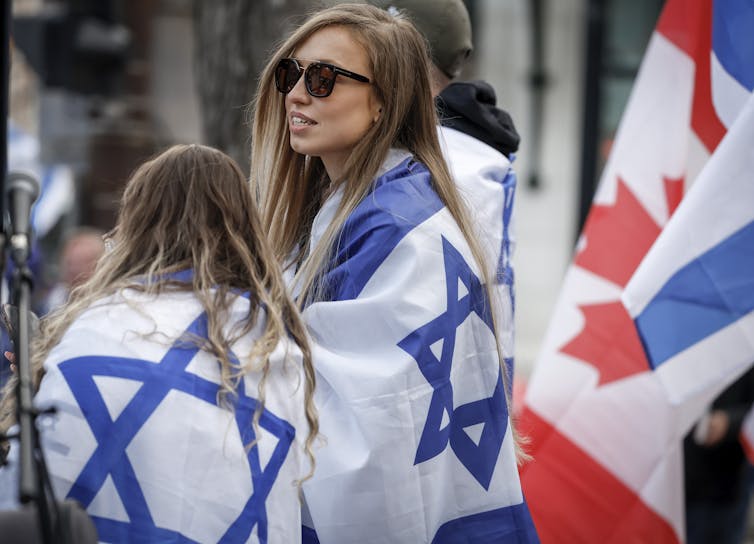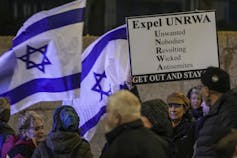More than a week has passed since the International Court of Justice (ICJ) mandated provisional measures against Israel following South Africa’s accusation of genocide.
The court’s demands were clear: Israel must take immediate steps to prevent genocidal actions in Gaza; prevent and punish incitement to genocide; allow access to humanitarian aid; and prevent the destruction and ensure the preservation of evidence of alleged crimes. It must also report back to the court within a month on the implementation of these measures.
There’s little evidence Israel has changed course, despite these clear orders. In fact, reports from Gaza suggest escalated violence and increased civilian casualties each day.

No adherence
In the days since the Jan. 26 ICJ ruling, Israel has intensified its military operations. According to the Health Ministry in Gaza, more than 27,000 Palestinians have now been killed and more than 66,000 injured since the Hamas attacks against Israel on Oct. 7, 2023.
Israel has also targeted several medical facilities in Gaza, including Nasser hospital, since the ICJ ruling. Instead of halting acts that could constitute genocide under Article II of the Genocide Convention, Israel’s military operations have expanded towards Rafah, intensifying the already dire situation in the last refuge for Gaza’s displaced — despite being labelled as a safe zone for civilians.
The United Nations Office for the Coordination of Humanitarian Affairs (OCHA) called Rafah a “pressure cooker of despair.”
In direct contravention
On Feb. 5, the United Nations Relief and Works Agency for Palestine Refugees in the Near East (UNRWA) published an image on social media showing its damaged food convoy, waiting to travel towards northern Gaza, after it said it was struck by Israeli naval gunfire. Such action would be in direct contravention of ICJ’s explicit order that Israel ensures basic services and humanitarian aid reaches civilians in Gaza.
Israel is continuing to pump seawater into tunnels throughout Gaza in its assault on Hamas’s labyrinth of tunnels, which experts warn could render Gaza uninhabitable for 100 years by contaminating underground fresh water.
These developments underscore the gravity of the conditions in Gaza following the ICJ ruling, and highlight the urgent need for Israel to comply with the orders.
Despite this, there is hope of a potential reprieve as, according to Qatar, Hamas has received a new ceasefire proposal and is reportedly responding positively to it.
What’s next?
The ICJ’s decision is legally binding, compelling Israel to adhere not only to the specific provisional measures, but also to the broader mandates of the Genocide Convention and the Geneva Conventions.
But the ICJ relies on the United Nations Security Council to ensure compliance with its decisions, a process complicated by geopolitical realities, namely the United States’ longstanding support of Israel and its potential use of its veto power at the Security Council.
Nonetheless, the ICJ ruling sends a clear message to the international community, especially to states allied with Israel, reminding them of the collective responsibility to respect and uphold international law.
As such, the implications of the decision extend well beyond the immediate parties involved. It raises concerns about Canada’s military exports, especially the $21 million of military equipment sent to Israel in 2022.
Legal experts remind us that, in alignment with the Export and Import Permits Act, such transactions should cease if there’s a substantial risk the exported goods could contribute to violations of international humanitarian or human rights law.
After weeks of silence by the Canadian government, Global Affairs Canada says it’s authorized, and continues to authorize, new permits for military exports to Israel since Oct. 7
The ICJ ruling places Canada in a difficult spot. Continuing military exports under these circumstances would not only breach Canadian law, but also contravene the country’s commitment to preventing genocide, potentially implicating Canadian officials in these acts.

The Global South strikes back?
In a broader context, the ICJ’s involvement represents an example of the Global South striking back, as international law expert Heidi Matthews argues in her podcast. South Africa’s historical fight against apartheid has made the Palestinian cause resonate for South Africans, lending credibility and moral weight to its case against Israel.
Nonetheless, despite the hope that the Global South may begin to effectively hold powerful nations to account, the international reaction to the ICJ ruling has been notably ambivalent.

Within hours of the ICJ decision, the White House paused its funding to the UNRWA in the wake of Israeli allegations that 12 of its staff were involved in the Oct. 7 Hamas attacks in southern Israel. Canada soon followed suit.
Josep Borrell, the European Union’s foreign policy chief, recently noted that the total suspended funds amount to more than US$440 million, which makes up half the agency’s expected funds for 2024.
Some nations aren’t following the U.S. lead. Spain has announced an urgent aid package of $3.8 million to UNRWA to ensure the organization can maintain its activities during this desperate situation.
Australia has also signalled it will resume its funding to UNRWA to prevent more children from starving given the lack of any sustainable alternative agencies to deliver aid to Gaza. Belgium has also announced it will continue to provide funds to UNRWA while monitoring the UN’s internal investigation.
Canada, meantime, says it will allocate an additional $40 million to support the humanitarian efforts of other organizations. But the specifics haven’t been disclosed, and there are few other organizations with the expertise and infrastructure to meet the needs of Palestinians in Gaza.
Upholding international law
The ICJ ruling calls for urgent action, not just from Israel, but also from the wider international community — including Canada — to uphold the tenets of international law and support humanitarian efforts.
Global Affairs Canada recently stated on social media that “Canada rejects any proposal that calls for the forced displacement of Palestinians from Gaza and the establishment of additional settlements. Such inflammatory rhetoric undermines prospects for lasting peace.”
Some have labelled this statement as “empty words,” given that Canada has yet to take clear actions following the ICJ decision, such as issuing sanctions against Israel or stopping arms exports.
Gazans are now eating grass and drinking polluted water to stave off death. By choosing not to resume its financial support for UNRWA during this pivotal time, Canada is intensifying its complicity in potential genocidal acts.
It’s time to reinforce, not weaken the UNRWA. UN Secretary-General Antonio Guterres has urged governments to resume funding, otherwise UNRWA will be forced to shut down operations by the end of February — not only in Gaza, but across the region.
The world is watching, and Canada’s actions now must showcase its commitment to justice, human rights and the rule of law.
Originally published in The Conversation
New Malaysia Herald publishes articles, comments and posts from various contributors. We always welcome new content and write up. If you would like to contribute please contact us at : editor@newmalaysiaherald.com
Facebook Comments